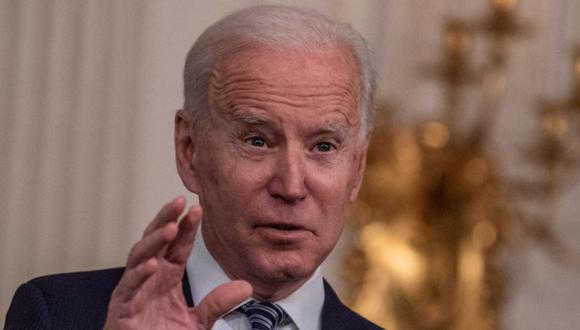The president presented on Wednesday his initiative to invest US $ 2 trillion in eight years in transportation, industry and internet networks to improve the country’s competitiveness.
To finance his ambitious infrastructure plan, US President Joe Biden wants to raise the corporate tax, a measure that has been criticized in the corporate sector but should not affect too much firms that benefited from steep tax cuts during the Trump era.
Biden presented on Wednesday his initiative to invest US $ 2 trillion in eight years in transportation, industry and internet networks to improve the competitiveness of the country.
This will create the most resilient, strong and innovative economy in the world, ”he said from Pittsburgh when presenting his plan.
The president is counting on companies to finance this general initiative, with a rise in corporate income taxes from 21% to 28%.
His predecessor, Donald Trump, lowered that tax from 35% to 21%.
Likewise, companies always paid below the official rate, according to a recent study released by a Congressional commission that showed that before Trump’s reform, payments reached 16% and then remained at 8%.
A 28% corporate income tax would continue to be among the lowest levels since World War II.
This tax mechanism in force since 2009 in the United States, reached 52.80% in 1968 and then went down without pause, except in 1993 when, at the beginning of Bill Clinton’s term, it rose from 34% to 35%.
The level that the White House manages would place the United States at one of the highest levels in the OECD after France and Colombia (32%), Australia, Mexico and Portugal (30%).
Disagreement
Some business groups have already expressed their disagreement with the idea.
The US Chamber of Commerce estimated that the proposals to finance the infrastructure plan are “dangerously misguided” and noted that a tax hike will slow the pace of reactivation “and make the United States less competitive.”
The Business Roundtable organization, which brings together the largest companies in the country, pointed out that it “strongly” opposes any tax hike and advocated a model in which expenses are financed by the users of the infrastructure, an alternative that does not it favors the government although it was mentioned last week by the Secretary of Transportation, Pete Buttigieg.
The Executive hopes to discourage the relocation of production and jobs and tax evasion by also imposing a minimum rate of 21% on the income of companies abroad.
It also plans to eliminate subsidies to the oil and gas industries.
This set of tax measures should allow, according to the White House, that the plan is paid in 15 years.
For Dean Baker, an economist at the Center for Economic and Policy Research (CEPR), the rise in corporate income tax “is not a leap into the unknown.” “Trump’s tax cuts have not been in place for decades,” he added.
Among other things, those measures of the previous administration had to be accompanied by a significant increase in investment by companies, which did not occur, he added.
“Multinationals and their shareholders will benefit from an infrastructure upgrade, currently in decline,” observed Chuck Marr, a tax specialist at the Center for Budget and Policy Priorities (CBPP).
“Going back on the sharp reduction in taxes decided by Donald Trump to finance large projects is good business for the economy,” said this expert, who gave as a positive example the planned expenses for research in semiconductors, components whose scarcity affects the automakers in the United States.
The tax increase could affect investments by foreign companies, which could turn to other countries, acknowledges Thornton Matheson of the Urban-Brookings Tax Policy Center.
But the United States “is still a large, dynamic economy that can bear a somewhat higher average tax rate than smaller countries,” he summarized.




